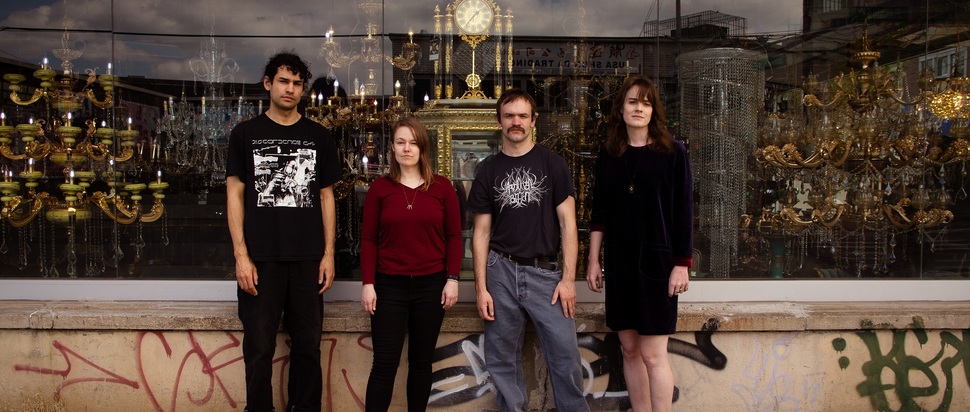Pushing It Forward: Liturgy's Haela Ravenna Hunt-Hendrix
With the release of their recent album 93696, Liturgy are still pushing themselves into bold new spaces. Ahead of their set at Glasgow’s new Core. Festival, we speak to the band’s Haela Ravenna Hunt-Hendrix
Liturgy spent their early years provoking as much ire as they did acclaim. For every time they received glowing reviews in spaces unprecedented for black metal, they received outright condemnation from others with their manifesto-cum-statement of intent essay Transcendental Black Metal acting as a lightning rod of controversy in the metal scene of the time. It was messy, and kind of contradictory, but it showed a conviction that entirely came through in the music. Crucially, it also wasn’t boring, which, given the early part of the 2010s' propensity for hyper-irony or faux-lumberjack tedium, really set them apart. It did not endear them however, to a certain strain of black metal diehard.
On the one hand Haela Ravenna Hunt-Hendrix’s open faith has been taken against by those committed to the genre’s initial anti-Christian rhetoric ("Liturgy came of age in a very secular time", she later notes in our conversation), while others decided, due to the band taking a broader influence from minimalists, noise rock and classical music, that they were posers and didn’t make black metal that was ‘pure’ enough. That strain of the fanbase hadn’t taken into account that maybe an obsession with purity isn’t the best look given the genre's history of prominent Nazi-sympathisers.
But over the years with every passing album their sound has grown more and more broad; initially with a heavier experimental electronic influence on 2015’s The Ark Work, before Hunt-Hendrix’s classical influences became ever clearer, reaching a peak on 2020's opera Origin of the Alimonies. This year’s 93696 marked a consolidation of all these things, exploring the concept of heaven by merging all of the band’s previous work into an 80-minute whirlwind of electronics, battering black metal crescendos and gorgeous, romantic classical moments. It’s far and away the finest record of their career and it has inspired a near unanimous rapturous reception.
Such unanimous praise didn’t feel like it would figure any time soon when Liturgy initially broke through amid such controversy. “There was so much irony,” Hunt-Hendrix notes of the era they burst into. “It was after grunge and alt-rock were over, but it was during the rise of the ‘hipster’ where people in the underground or counter-culture wanted to distinguish themselves from ordinary society, but didn’t really have any faith or hope in anything, and also, weren’t that upset.”
Liturgy by contrast, no matter what you thought of them, clearly meant it when they said it. 93696 is no exception, full of forceful, totally unaffected sincerity but executed flawlessly. ‘‘It does feel like the record to silence the haters once and for all,” Hunt-Hendrix accepts. “I wanted to make a record that was as metal as [our 2011 record] Aesthetica was on its own terms, whilst also incorporating everything from the more experimental records.”
This sense of going full circle, collecting and consolidating what Liturgy has been up to this point leads to the question: Where to from here? While there is no intention of ceasing work with the band, Hunt-Hendrix notes that she is “more and more interested in visual art, film and opera.” Also a multimedia artist, with recent sculpture show As the Blood of God Bursts the Veins of Time at Gern en Regalia in New York (works from which constitute 93696’s cover), and the aforementioned 2020 opera, as well as an accompanying but unreleased film (“I guess I got kind of shy about it,” she says by way of explanation), Hunt-Hendrix shows a sense of someone with a very free concept of what the band can be, incorporating as many elements as are needed to get the point across.
We discuss William Blake as a key influence, and his pursuit of an idea through multiple mediums seems to be a forebear of her overall artistic vision. “I like the space in-between, I really am drawn towards the margins between different cultural silos. I like having a bit of interface with a lot of different genres, regimes of judgement. I don’t imagine a future where I’m just writing symphonies.” When asked where this may lead she has as ever grand plans. “I do like the idea of multimedia, opera, maybe even like a role-playing game. I’ve been learning Unreal Engine. It feels easy to imagine a digital opera, with characters I create in it, it has our music, maybe it’s an album too.”
As for what to expect at Core., Hunt-Hendrix says the band have captured the spirit of the initial DIY warehouse shows they were playing when they started out. “These shows have been the most powerful of any shows we’ve ever done. I think with the songs being so long, people really go into a kind of trance. There’s people being all over the place when we’re playing. Sometimes I’m crying.” Hunt-Hendrix gives the sense that Liturgy are a band who have finally pushed through controversy to where they should have been all along, accepted as a group more akin to Throbbing Gristle or The Residents. Rather than pigeonholed within the black metal community, left to be a cross-medium pursuit of a personal idea, and in the process making some of the most ecstatic guitar music around.
Liturgy play Core. a celebration of noise, Maryhill Community Central Halls and The Hug & Pint, Glasgow, 18-20 Aug
93696 is out now on Thrill Jockey
liturgy.bandcamp.com
corethefestival.com
